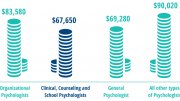
Psychologists and counselors are both mental health practitioners. Individuals in both fields are state licensed. They provide services that are reimbursable by insurance companies. In fact, they often have overlapping duties. However, there are some distinctions, both in their training and their scope of practice.
Training for Counselors and Psychologists
Counselors have master’s level education, though their master’s programs are longer than those in many fields. Clinical mental health counseling programs are transitioning to a 60 semester hour minimum. Some counseling specialties, like school or career counseling, require only 48.
Counseling programs follow curriculum standards set by CACREP. Many of the standards focus on the practical skills needed to help individuals through their life challenges.
Psychologists are more likely to work with individuals with serious mental illness.
Human growth and development, diversity and multicultural issues, and career development are among the core concepts.Counseling programs do include coursework in research, but the focus typically is on being a good consumer of research and using the latest information to inform practice. Mental health counseling programs include some coursework in psychopathology and some in assessment. Overall, there’s less quantitative work in a counseling program, though, and less “number crunching”.
Most psychologists, on the other hand, have training at the doctoral level. Some specialties, like occupational industrial psychology require less, but it takes a doctoral degree to sit down and work one on one with clients as a clinical or counseling psychologist.
All graduate level mental health programs are competitive, but PhD programs for psychologists are especially so. A strong GPA and test scores are a must. Programs vary in the degree of importance they place on research. Some like to see undergraduate research.
Programs follow standards set by the APA. The program typically includes more statistics and quantitative work. Psychometric assessments are covered in depth. A psychology candidate does put in many hours in the field. A lot of time, though, may be spent completing a dissertation and participating in other research activity.
There is often a greater emphasis on psychopathology. This will vary by specialty, however. Clinical psychologists typically have more training in treating serious mental illnesses like bipolar disorder or schizophrenia.
Scope of Practice
A psychologist’s scope of practice typically includes administration of a wide range of tests including IQ tests and tests of neurological function. Psychologists may administer tests to patients they do not see on a regular basis.
Source: www.counselor-license.com
|
(ethics, law) ASSESSING AND MANAGING RISK IN PSYCHOLOGICAL PRACTICE (Book + 8 CE Credits) by Bruce Bennett, Ph.D, ISBN 978-061513416-1 (continuing education, psychology, social work, psychiatry) Single Detail Page Misc (Red Toad Road company)
|
You might also like:



|
(law, ethics) PSYCHOLOGICAL EVALUATIONS FOR THE COURTS, 3RD EDITION (Book + 5 CE Credits) the 122-page section entitled General Considerations in the book by G. Melton, J. Petrila, N. Poythress, C. Slobogin, ISBN 1572309661 (continuing education, psychology, psychiatry, social work) Single Detail Page Misc (Red Toad Road Company)
|



|
(health) Cognitive Therapy for Chronic Pain by Beverly Thorn, Ph.D. (7 CE Credits or 7 CME credits only, book not included) ISBN 1572309792 (Continuing education, continuing medical education) Single Detail Page Misc (Red Toad Road company)
|


















A psychologist has a Ph.D. in psychology, whereas a licensed counselor usually has a master's degree. Do you want to know MORE?
My dear Sarah...
Well...I came a little bit "too late"...-smile- because "GMAC9" has perfectly described the differences between the various professionals...and it's true...Psychiatrists are the ONLY ones, who can prescribe medications...all the "others" are "only" reating you "verbally"..-smile-
However....there are some differences in the "approach" ...and also a small difference in the amount of costs "per session"...I guess, you should check with your Health Insurance first....to find out...if...and what they're covering...otherwise...it could be a cotly endeavor, honey ! So check…